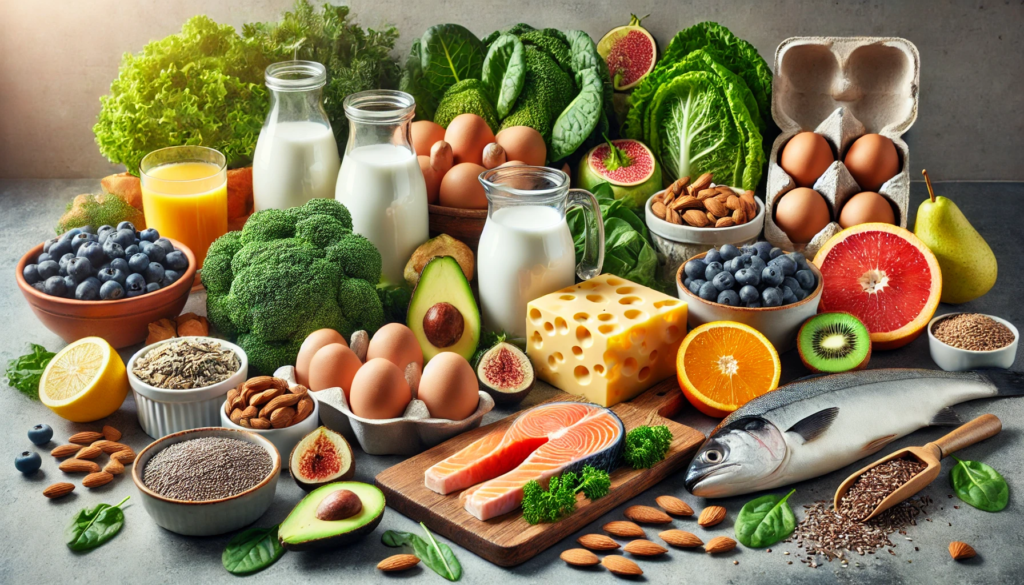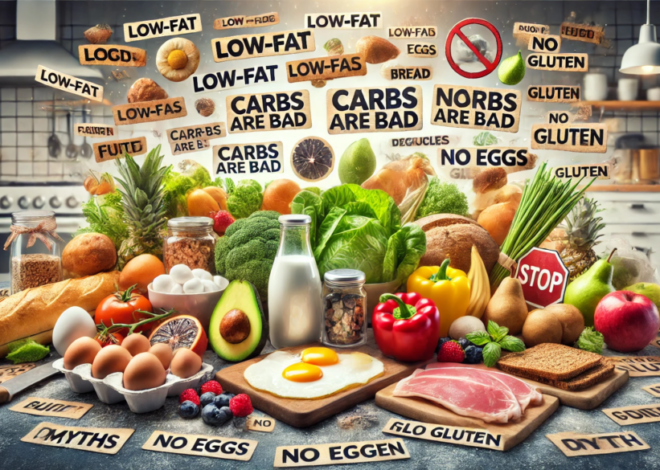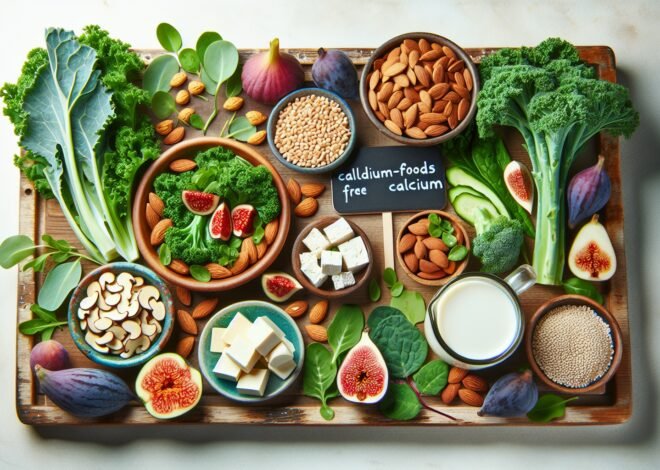
Top 20 Foods to Support Strong and Healthy Bones
Maintaining strong and healthy bones is essential at every stage of life. Bones provide structure, protect organs, and store essential minerals like calcium and phosphorus. As we age, bone density can decline, leading to conditions like osteoporosis, making it crucial to consume nutrient-rich foods that support bone health. Incorporating the right foods into your diet can help keep bones strong and reduce the risk of bone-related disorders.
Here are the top 20 foods you should add to your diet to promote strong and healthy bones.
1. Dairy Products: Milk, Cheese, and Yogurt
Dairy products like milk, cheese, and yogurt are some of the best sources of calcium, a mineral essential for building and maintaining strong bones. Calcium plays a vital role in maintaining bone density and preventing bone fractures.
In addition to calcium, dairy products are rich in vitamin D, which helps the body absorb calcium more effectively. Regular consumption of dairy products ensures that your bones get the nutrients they need to stay strong. Aim for two to three servings of dairy per day for optimal bone health.
2. Leafy Greens: Kale, Spinach, and Collard Greens
Leafy greens such as kale, spinach, and collard greens are excellent plant-based sources of calcium. They are also rich in vitamin K, which is crucial for bone mineralization and bone density.
Vitamin K helps regulate calcium balance in the body and plays a role in the production of proteins essential for bone health. Eating leafy greens regularly can help prevent bone loss and reduce the risk of fractures.
Add these greens to salads, smoothies, or soups to enhance your calcium intake without relying solely on dairy.
3. Fatty Fish: Salmon, Sardines, and Mackerel
Fatty fish like salmon, sardines, and mackerel are not only rich in omega-3 fatty acids but are also excellent sources of vitamin D. Vitamin D helps the body absorb calcium and promotes bone growth and remodeling.
Sardines, in particular, contain calcium in their edible bones, making them a double powerhouse for bone health. Regular consumption of fatty fish can help maintain bone density and reduce the risk of osteoporosis.
Aim to include fatty fish in your diet at least twice a week. Grilled, baked, or poached options are healthy ways to enjoy these nutrient-rich fish.
4. Almonds
Almonds are a great source of calcium, magnesium, and phosphorus, all of which are essential for bone health. Magnesium plays a key role in converting vitamin D into its active form, which helps with calcium absorption.
Phosphorus is another mineral that contributes to bone formation and repair. Consuming a handful of almonds as a snack or adding them to your oatmeal or yogurt can help support your bone structure.
Incorporate almonds into your diet regularly to boost your intake of bone-supporting minerals.
5. Tofu
Tofu is an excellent plant-based source of calcium, especially when it’s made with calcium sulfate. It is also rich in protein, which helps maintain muscle mass and supports bone health.
For those who follow a vegetarian or vegan diet, tofu can be a crucial food for maintaining strong bones. It’s also a versatile ingredient that can be used in stir-fries, soups, or salads.
Choose calcium-fortified tofu to maximize its bone-strengthening benefits.
6. Fortified Plant Milks
Fortified plant-based milks, such as almond, soy, or oat milk, are often enriched with calcium and vitamin D, making them great alternatives for those who avoid dairy. These fortified products can help you meet your daily calcium and vitamin D needs, essential for strong bones.
Plant milks are also a good source of protein and other nutrients, depending on the variety. Look for unsweetened versions to avoid added sugars.
Drink a glass of fortified plant milk or use it in smoothies to support bone health without consuming animal products.
7. Eggs
Eggs, particularly the yolks, are a good source of vitamin D, which helps the body absorb calcium and supports bone mineralization. While eggs don’t contain a significant amount of calcium, they play a crucial role in regulating the calcium that gets absorbed into your bones.
Including eggs in your diet can be a simple and effective way to boost your vitamin D levels. Enjoy them boiled, scrambled, or as part of a healthy breakfast to support bone health.
8. Figs
Figs are a calcium-rich fruit that can be a sweet and healthy addition to your diet. In addition to calcium, figs contain potassium and magnesium, both of which help improve bone density and reduce the risk of bone loss as you age.
Fresh or dried, figs can be a delicious snack or added to salads and baked goods. A handful of dried figs provides a significant amount of calcium and other essential nutrients that benefit bone health.
9. Chia Seeds
Chia seeds are small but mighty when it comes to bone health. They are loaded with calcium, phosphorus, and omega-3 fatty acids, all of which contribute to strong bones.
The calcium content in chia seeds is particularly high, making them a great option for those looking to boost their calcium intake from plant-based sources. The omega-3s in chia seeds also support bone density by reducing inflammation.
Sprinkle chia seeds on yogurt, oatmeal, or add them to smoothies for an easy and nutritious bone-boosting meal.
10. Fortified Orange Juice
Orange juice fortified with calcium and vitamin D is another excellent option for supporting bone health. While oranges themselves don’t naturally contain calcium, the fortified versions can help meet your daily calcium and vitamin D requirements.
Vitamin C, found in abundance in oranges, is also essential for collagen production, which helps maintain the structural integrity of bones. Enjoy a glass of fortified orange juice with breakfast to get a nutrient-packed start to your day.
11. Fortified Cereals
Many breakfast cereals are fortified with essential bone-supporting nutrients, including calcium and vitamin D. These cereals can be a convenient and tasty way to ensure you’re getting enough of these crucial nutrients.
Pair fortified cereals with fortified plant milk or dairy milk to double up on calcium and vitamin D. Just be sure to choose low-sugar or whole-grain varieties for the best overall health benefits.
12. Sweet Potatoes
Sweet potatoes are rich in magnesium and potassium, two minerals essential for bone health. Potassium helps neutralize acids in the body that can leach calcium from the bones, while magnesium plays a role in activating vitamin D.
Eating sweet potatoes regularly can support bone density and reduce the risk of fractures. Bake or roast them for a healthy and delicious side dish that complements any meal.
13. Broccoli
Broccoli is a cruciferous vegetable that contains calcium, vitamin K, and magnesium, all of which contribute to strong bones. Vitamin K is particularly important for bone formation and preventing bone-related diseases like osteoporosis.
Broccoli is also rich in antioxidants, which help protect bone cells from damage caused by oxidative stress. Adding broccoli to your diet can enhance your intake of bone-supporting nutrients.
Steam, roast, or stir-fry broccoli to incorporate it into your daily meals.
14. Pumpkin Seeds
Pumpkin seeds are an excellent source of magnesium, which is essential for bone structure. They also contain phosphorus, another key mineral that supports bone formation and repair.
Including a handful of pumpkin seeds in your diet can help maintain healthy magnesium levels, which are important for bone strength. Sprinkle them on salads, yogurt, or eat them as a snack for a crunchy, bone-boosting treat.
15. Lentils
Lentils are a plant-based source of calcium, magnesium, and phosphorus, all of which are important for maintaining healthy bones. They are also rich in protein, which helps preserve muscle mass and bone strength.
In addition to their bone-supporting nutrients, lentils are high in fiber, which supports overall health. Adding lentils to soups, stews, or salads can help meet your daily calcium and magnesium needs.
16. Tofu
Tofu is a versatile plant-based protein that is often fortified with calcium, making it a great addition to a bone-healthy diet. In addition to calcium, tofu provides a good amount of magnesium and phosphorus, which are critical for bone strength.
For vegetarians and vegans, tofu is an excellent source of calcium, as well as protein, which helps maintain muscle mass and supports bone health. Incorporate tofu into stir-fries, salads, or soups for a nutritious and bone-boosting meal.
17. Sardines
Sardines are one of the richest sources of calcium from seafood. Their small, edible bones are packed with calcium and phosphorus, both of which contribute to strong and healthy bones. Additionally, sardines are a good source of vitamin D and omega-3 fatty acids, which help with calcium absorption and reduce bone loss.
Eating sardines on a regular basis can help improve bone density and lower the risk of fractures. They are also versatile and can be added to salads, pasta dishes, or eaten as a quick snack.
18. Beans
Beans, particularly white beans and navy beans, are excellent plant-based sources of calcium, magnesium, and potassium. These nutrients are essential for bone density and the prevention of bone-related diseases.
Incorporating beans into your diet can help boost your intake of essential minerals that support bone health. They are also high in fiber and protein, making them a great addition to soups, stews, or salads.
19. Oranges
Oranges are not only a great source of vitamin C but also contain small amounts of calcium and potassium, both of which are important for bone health. Vitamin C is essential for the production of collagen, a protein that makes up a significant part of your bone structure.
Eating oranges regularly can help support your body’s ability to build and maintain strong bones. You can enjoy oranges as a snack or add them to salads and smoothies.
20. Sesame Seeds
Sesame seeds are rich in calcium, magnesium, and phosphorus, which are all vital for maintaining strong bones. In addition to these minerals, sesame seeds also contain zinc, which supports bone mineralization and prevents bone loss.
Incorporating sesame seeds into your diet can help you meet your daily calcium needs, especially if you follow a plant-based diet. Sprinkle sesame seeds on salads, stir-fries, or yogurt for a delicious and nutritious addition to your meals.
Conclusion
Maintaining strong and healthy bones is crucial for long-term health, and incorporating bone-boosting foods into your diet is a simple way to support your skeletal system. Whether you’re getting calcium from dairy products, plant-based sources, or fortified foods, it’s important to include a variety of nutrients in your diet to maintain optimal bone health.
Regularly consuming these top 20 foods will help you strengthen your bones, reduce the risk of fractures, and promote overall well-being.
FAQ: Foods for Strong and Healthy Bones
1. What are the best foods for strong bones?
The best foods for strong bones include those rich in calcium, vitamin D, magnesium, and phosphorus. These nutrients are essential for building and maintaining bone density. Dairy products like milk, cheese, and yogurt are top sources of calcium, while fatty fish like salmon and sardines provide vitamin D. Leafy greens, fortified foods, and nuts such as almonds are also excellent choices for supporting bone health. Incorporating a variety of these foods ensures that your body gets the nutrients it needs for strong bones.
2. How much calcium do I need per day to maintain healthy bones?
The recommended daily calcium intake varies by age and gender, but adults generally need around 1,000 milligrams (mg) per day. Women over the age of 50 and men over 70 should aim for 1,200 mg per day, as bone loss tends to accelerate with age. You can meet these needs by consuming calcium-rich foods like dairy, leafy greens, and fortified plant-based milks. If you’re not getting enough calcium through your diet, you may want to consider a supplement, but it’s always best to consult a healthcare professional before doing so.
3. Can I get enough calcium without consuming dairy?
Yes, you can get enough calcium without dairy by including other calcium-rich foods in your diet. Leafy greens like kale and spinach, tofu, fortified plant milks (such as almond or soy milk), fortified cereals, chia seeds, and almonds are excellent sources of calcium. Additionally, calcium-fortified orange juice is a good option for boosting your calcium intake. Combining a variety of these foods will help you meet your daily calcium requirements even without consuming dairy products.
4. What role does vitamin D play in bone health?
Vitamin D is crucial for bone health because it helps the body absorb calcium from the foods you eat. Without enough vitamin D, your body can’t effectively use the calcium you consume, which can lead to weakened bones and conditions like osteoporosis. The best sources of vitamin D include fatty fish like salmon and sardines, egg yolks, and fortified foods such as milk and cereals. Sun exposure also triggers the production of vitamin D in the skin, so spending time outdoors can help maintain adequate levels.
5. What foods should I avoid for bone health?
Certain foods can negatively impact bone health, especially when consumed in excess. High-sodium foods, processed foods, and sugary beverages can lead to calcium loss by increasing the excretion of calcium through urine. Excessive alcohol and caffeine intake can also interfere with calcium absorption. Carbonated soft drinks, which often contain phosphates, can disrupt calcium balance in the body. Limiting these foods and focusing on nutrient-dense options will help protect your bones in the long term.
6. Can diet alone prevent osteoporosis?
While a healthy diet rich in bone-supporting nutrients is critical for preventing osteoporosis, it’s not the only factor. Exercise, particularly weight-bearing and resistance exercises, is also essential for maintaining bone density. Lifestyle habits, such as avoiding smoking and limiting alcohol, play a role as well. Genetics and age can influence your risk of osteoporosis, so it’s important to adopt a comprehensive approach that includes proper nutrition, physical activity, and lifestyle choices to protect your bone health.











